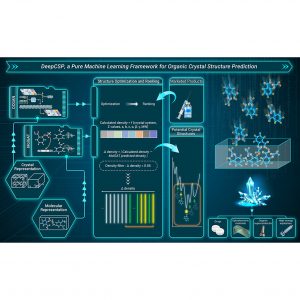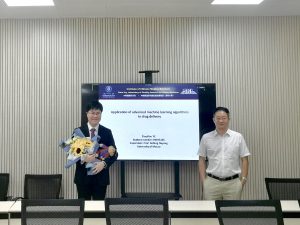The research team, led by Dr Ouyang Defang from the State Key Laboratory of Quality Research in Chinese Medicine, Institute of Chinese Medical Sciences, and Department of Public Health and Medicinal Administration, Faculty of Health Sciences at the University of Macau, has introduced an innovative machine learning framework named DeepCSP for predicting the crystal structure of organic compounds. Employing conditional generative adversarial network and graph convolutional networks, DeepCSP achieves the swift crystal structure predictions within minutes. The research, titled “Organic Crystal Structure Prediction via Coupled Generative Adversarial Networks and Graph Convolutional Networks,” has been published in the esteemed academic journal The Innovation.
The structure of organic crystals directly or indirectly impacts physicochemical properties and biological effects, including density, solubility, melting point, and bioavailability. In pharmaceutical research, the crystal form of a drug significantly influences the solid-state properties, stability, and bioavailability, thereby affecting the safety, efficacy, and manufacturability of drugs. Nevertheless, traditional experimental screening for crystal structures encounters challenges such as the iterative trial-and-error process, substantial labor and time costs, and uncertainty in the endpoint of crystal structure screening. The emergence of Crystal Structure Prediction (CSP) technology aims to address these issues. CSP endeavors to explore all stable crystal structures starting from 2D molecular structures. However, traditional CSP methods usually rely on the expensive quantum mechanics theories and are limited by the possible missing trial space and the lengthy calculation cycle.
The research team developed DeepCSP, a machine learning framework comprising two key modules for crystal structure generation and ranking. DeepCSP can rapidly predict the organic compound crystal structures by utilizing the organic compound crystal structure conditional generative adversarial network (OCGAN) and the molecular graph convolutional network with the attention mechanism (MolGAT). Significantly, the prediction capability of DeepCSP was validated using a crystal structure dataset of the marketed drugs, and the case studies further demonstrated its functionality and performance. This novel study brings new vitality into the organic crystal research, offering potential benefits for areas such as drug development.
The corresponding author of the study is Dr Ouyang Defang, and the first author is the ICMS doctoral graduate Ye Zhuyifan (now Lecturer at Macao Polytechnic University). Professor Zhou Jiantao from the State Key Laboratory of Internet of Things for Smart City (IOTSC) and Faculty of Science and Technology at University of Macau, and Ph.D. candidate Wang Nannan from ICMS also made significant contributions to the research. The Super Intelligent Computing Center of IOTSC provided quality services for the study. Macao Polytechnic University provided the support for the Cambridge Structural Database. The research received funding from University of Macau Research Grant (MYRG-CRG2022-00008-ICMS), Shenzhen-Hong Kong-Macau Science and Technology Program (Category C) of Shenzhen Science and Technology Innovation Commission (SGDX20210823103802016) and industry-university-research cooperation project and Zhuhai-Hong Kong-Macao cooperation project from Zhuhai Science and Technology Innovation Bureau (ZH22017002210010PWC). The full article can be accessed at: https://doi.org/10.1016/j.xinn.2023.100562.



